Like many of my colleagues in higher education programs, I am often asked what is the difference between an Ed.D. and a Ph.D.? As a holder of an Ed.D., yet also a research faculty member, I may get these questions even more. I want to describe the major differences between the degrees (at least on paper). Also, I want to challenge our field to move our rhetoric about the differences more toward reality.

Unfortunately, in most higher education programs, the reality is that the degrees often differ very little.
That said, I do think it is important to consider the distinctions between the two to help think about how we might consider a better focus in both programs (a point for a later post).
A Ph.D. student in higher education should focus on the following:
- Dissertation research on a narrow subject designed to develop theoretical understanding
- Individual work with faculty through research assistantships
- Development of a thorough understanding of the research literature in higher education as well as other related disciplines.
An Ed.D. student in higher education should focus on the following:
- Dissertation research on a problem of practice encouraging application of knowledge
- Practice the application of theory through courses and interaction with faculty
- Development of key capacities to lead colleges and universities.
The fundamental difference between an Ed.D. and a Ph.D. relates to theory. Ph.D. students as future researchers learn knowledge to develop future theoretical understanding. By comparison, Ed.D. students work to apply existing theory to their own professional practice.
Another key hallmark of any doctoral program is socialization. In preparing future research faculty, Ph.D. program socialize students to the professoriate. Ed.D. programs prepare students to enter or advance as administrators.
As a result, programs should help develop and extend opportunities for students to expand their expertise as practitioners.
The reality is that most higher education Ph.D. and Ed.D. programs espouse distinction between the degrees without any real difference.
Since the 1930’s, differentiation between the two degrees has been problematic. Students often enroll in the same classes. Many offer the Ph.D. to aspiring researchers and practitioners clouding any substantial difference in the education each group should gain.
Given the reality that a Ph.D. is often considered more prestigious, it is little surprise that when given the option future faculty and administrators would opt for the Ph.D.
The reality is that higher ed programs make the same calculation. If given the option, programs frequently seek to offer a Ph.D., especially flagship universities and aspiring research institutions.
The problem with this is how it impacts the standards and practices of our field.
Students often underperform as Ph.D. students (at least as compared to traditional arts and science standards) or are better prepared from research rather than administrative careers.
As faculty in higher education programs, we deserve the criticisms we receive about our doctoral education and hurt the broader perceptions of our students’ work.
The differences may often be rhetorical, but all of us need to work toward making them a reality.

